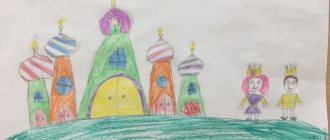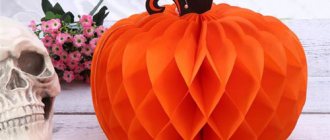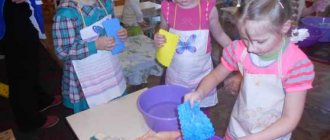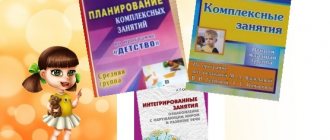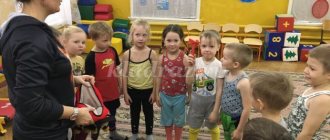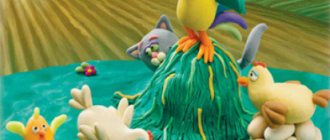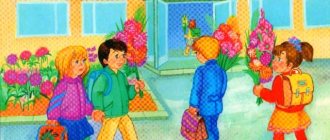Complex classes in the preparatory group of preschool educational institutions
Educator: - Hear, someone is knocking on the door. What do we do? Is it possible to open the door right away, most likely it’s mom who came? Why? (children's answers). Child:- If you stayed at home,
- And there was a knock on the apartment,
- The doorbell rang-
- Don't open it for anything
- You can't let strangers into the house.
- It’s better right away, so you know,
- Call mom and dad.
Educator: - When you are home alone, do not open the door for anyone, even if the person behind it says that your parents sent him. Children are invited to listen to an excerpt from S. Ya. Marshak’s poem “Fire”. Educator: - What should you do if a fire occurs? Children: - If something catches fire in the house, quickly leave or run out of the room or apartment, tell adults about it and ask them to call “01”, say that there is a fire in your house, and be sure to give your address; call mom at work. - If there is a lot of smoke in the apartment, bend low and move towards the door, covering your nose and mouth with a wet towel or scarf. - You can’t hide in far corners, under beds, closets - not only fire is dangerous, but also smoke. Practical task: “Report a fire by phone” (Children imitate calling the fire department). Child:
- You can’t handle a fire yourself, This is not work for children. Without wasting time, call “01” quickly. Dial skillfully, so that not everything burns! (L. Zilberg)
The crow Karkusha is flying: - Kar! Kar! Kar, guys! Hello! Have you met my friends here by any chance? (At this time, two children are quarreling, taking the ball from each other) - Oh, there you are! Guys, meet my friends. Opasik: - My name is Opasik! I warn all the guys about the danger! Safe: - My name is Safe, and I love to play! Karkusha: - So why are you quarreling? Security: - Because Opasik is a greedy person! Opasik: - The security guy chooses the wrong items to play with! Educator: - Guys, let's help friends make peace and divide all the points of dispute into those that are safe for play and those that are dangerous. Game: “Dangerous - Safe” (Children are divided into two teams. The first team collects safe items in the Safety basket. The second team collects dangerous items in the Opasika basket. The team that fills its basket correctly and quickly wins.) After the baskets will be filled, the results are summed up. Children explain how the following items can be dangerous: scissors, dishwashing detergent, tablets, nails, matches, knitting needles, beads, vitamins. Educator:
- To distant villages, cities Who is walking on the wires? Light Majesty - This is... electricity.
- I run along the paths, I can’t live without paths. Where am I, guys, there’s no light in the house? (Electricity).
Educator: -Can we live without electricity? (No). Right. Electricity is available in every home. This is our very first assistant. When it gets dark, we just need to click the switch button and the room is illuminated by the bright light of the lamp. Current runs through wires and makes electrical appliances work. And there are a lot of them in our house. For example:
- There is a window in the houses that is a little unusual. Whoever appears in the window will say a word to the whole country. (TV).
- The steamer goes back and forth. And behind him there is such a smooth surface, Not a wrinkle can be seen. (Iron).
- He is alone in the whole world. Very glad to meet dust. (Vacuum cleaner).
- On the table, in a cap, and in a glass bottle, a friend settled - a cheerful light. (Desk lamp)
- Only me, only I am in charge in the kitchen. No matter how hard you work without me, you will go without lunch. (Plate)
- I'm pot-bellied and puffing, I'm beautiful and shiny, If I just want to, I'll boil some boiling water. (Samovar, electric kettle)
Educator: - Let’s imagine that electricity stops flowing to your house, what will happen? (Children express their guesses). This means that we can conclude that electric current is our friend and comrade. Child:
- The current runs through the wires, It brings light into our apartment, So that the devices work: Refrigerator, monitors, Coffee grinder, vacuum cleaner - The current brings energy!
Child:
- Everyone knows that we cannot live a day without fire! In the fire, as in the sun - it’s light! It’s warm in the fire and in winter! But when we are careless with fire, it becomes our enemy.
Educator: - What rules of caution should we know and follow? Children name the rules and, together with the teacher, summarize the answers. - Remember! Never touch switched on electrical appliances with wet hands! Water passes current through itself. — Do not use water near switched on electrical appliances. Do not water flowers hanging above TV and other electrical appliances. — Do not use the outlet yourself; ask adults to turn on or turn off the electrical appliance. — Do not touch switched-on electrical appliances with metal objects (screwdrivers, scissors). — Do not touch the electrical wire. — When leaving home, check whether electrical appliances and the gas stove are turned off. Drawing signs “This is dangerous! Be careful!" Children are asked to come up with a prohibitory sign for their home, draw it, and then explain what is prohibited.
Summary of combined speech therapy classes in the preparatory group
Synopsis of a frontal speech therapy lesson in a preparatory group (combined) on the topic: “Insects”
Description of the material: I offer you a synopsis of a frontal speech therapy lesson for a preparatory group for school, on the topic “Insects”. This material will be useful to teachers and speech therapists of the preparatory group of kindergarten. This lesson summary is of a combined type. Objectives: 1. Introduce children to the names of insects: bee, ant, grasshopper, dragonfly, butterfly, ladybug, beetle, fly, mosquito, spider. Enrich children's vocabulary with the names of insects. Development of grammatical structures. Literacy training: conduct sound analysis of words, draw up sentence diagrams, divide words into syllables, develop phonemic awareness - word synthesis. Development of coherent speech: be able to compose a sentence based on a given word. Development of the intonation side of speech. 2. To instill in children a caring attitude towards nature; Explain that a fly is a harmful insect. Tell children about the benefits of some insects. 3. Development of attention, memory, thinking, general and fine motor skills. Equipment: colored pencils and a simple pencil, chalk, panels with vowels and consonants, pictures of insects (bee, ant, grasshopper, dragonfly, butterfly, ladybug, beetle, fly, mosquito, spider), workbooks, boxes of chips – symbols of sounds and sentence patterns, a guide for the development of the intonation side of speech (pitch, strength, timbre of the voice), a guide for the development of attention and sound synthesis.
Contents of the lesson:
1. Organizational moment. (in a circle with a ball) The speech therapist asks a question and throws the ball to the child, the child answers and returns the ball to the speech therapist. Questions can be on different topics. For example: - “What doesn’t fit? The speech therapist names a number of words: squirrel, bear, dog. The child says: “dog.” Sits down. Repetition of covered topics. What is a sound, letter, syllable, word, sentence, the concepts of vowel, consonant, voiced, voiceless. 2. Introduction to the topic. - Read the word based on the first sounds of the names of the pictures. (sunflower, asters, snail, stroller). Who is this? - spider. — Today we will get acquainted with some insects. 3. Main part. 1) - But first, let’s reproduce the pure saying (whisper, quietly, loudly, slowly, quickly): A bee sat on a flower, she drinks fragrant juice.
2) Conversation about insects. - What insects do you know? The children list the names of insects. — Game “Be careful and read the name of the insect.” Each child is given a card. It is necessary to add and read the name of the insect in a given geometric figure. The child reads, goes to the board, shows the corresponding picture and talks about the insect with the help of a speech therapist. Come up with a proposal. - But there are other insects, let's guess the riddles: Not an animal, not a bird, but a nose like a knitting needle. (Mosquito) Many craftsmen built a hut without corners. (Ant) The flower was sleeping and suddenly woke up: it didn’t want to sleep anymore, it moved, perked up, soared up and flew away. (Butterfly) I don’t sew clothes, but weave fabric. (Spider) In the fall it will hide in the crack, and in the spring it will wake up. (Fly)
3) Divide the words into syllables.
4) Sound analysis of words. – Lay out the sounds of words with chips: dragonfly, grasshopper, butterfly. — How does a sound differ from a letter? 5) Physical exercise “Dragonfly” This is what a dragonfly is like – very round eyes. It rotates like a helicopter: right, left, back, forward. Raise your shoulders, jump grasshoppers! Jump - jump, jump - jump. Sit down, sit down, eat some grass, listen to the silence, Higher, higher, high, jump on your toes easily! 6) Game “One - Many”. 7) Work in notebooks. – Read the sentence, rewrite it and make a diagram for it. — Make a pattern of a butterfly and a caterpillar in your notebook. 4. Summary of the lesson.
We recommend watching:
Lesson notes for children aged 6-7 years. Automation of sound [Rb] Frontal lesson in a preparatory speech therapy group Synopsis of an open speech therapy lesson in a preparatory school group “Meeting Spring” Synopsis of an individual speech therapy lesson. Automation of sound L
Similar articles:
Lesson notes for a senior speech therapy group. Sound K
Summary of GCD for children of the senior speech therapy group
Summary of a speech therapy session with children 5-6 years old with mental retardation
Summary of educational activities in the older group of children with severe speech impairments on the topic: “Sounds S - Z”
Summary of educational activities in the senior group of children with severe speech impairments on the topic: “Sounds S - Sh”
Final comprehensive lesson in the preparatory group. Abstract
Summary of the final comprehensive lesson in the preparatory group “Journey through the Land of Knowledge.”
Goal: Consolidation and generalization of acquired knowledge and skills during the academic year. Objectives: 1. Educational: develop cognitive interest in educational activities through the inclusion of a variety of game tasks.
2. Developmental: develop fine motor skills, attention, intelligence, visual memory, imagination. 3. Educational: to update the skills of cooperation, mutual understanding, goodwill, independence. Materials: steering wheel, geometric shapes, chick, bird, nest, flowers with numbers, clearing, chairs, tickets, pencils, audio recording, wood. Progress of the lesson.
1. Organizational moment. - Guys, guests came to our lesson today. I say hello everywhere at home and on the street, even “Hello!” I say to the neighbor's chicken. Hello, golden sun! Hello, blue sky! Hello, free breeze! Hello, little oak tree! Hello sun! Hello day! We are not too lazy to say hello! Hello! 2. Main part. — Guys, do you like to travel? And today I invite you on a journey through the Land of Knowledge. And what we will go there with, you will find out by guessing the riddle. The engine sneezes and runs out into the open. And along the ringing street He runs, worried. Market, post office and train station, So that no one is late. (Bus). — That's right, by bus. - Guys, but you can only get on the bus with tickets, and to get it you have to answer questions. We listen carefully, raise our hand and answer. The tickets have seat numbers on them, and everyone goes to their own place. Questions: 1. What is the name of our country? 2. What is the name of our region? 3. Who is the president of our country? 4. What is the name of the model of the globe? 5. What city do we live in? 6. What colors does our flag have? 7. What is the name of our river? 8. What is the largest sea animal? 9. What does a bear do in winter? 10. What color is the water? 11. What do we hear? 12. Evergreen tree? 13. How many months are there in a year? 14. Does a snake have paws? 15. What season comes after spring? -Guys, save your tickets until the end of the journey, we will need them later. Has everyone taken their seats? Go. (The soundtrack of the song “We are going, going, going” is turned on.) - Guys, to start our journey, let’s stand in a circle. Let's hold hands together and smile at each other. We will shake each other's hands, Warmth will run in a circle. Together we will answer questions very amicably, We all want to study, We all want to know a lot. Task No. 1. -Let's go to the tables, guys, and see what's on them (flowers with numbers depicted in the middle of the flower). Please note that there are missing numbers on the flowers as there was a strong wind and blew away the missing numbers. - Now think about what number needs to be added to each petal so that the total is the number written in the middle of the flower. Well done! -Guys, where do flowers grow? -What are they for? - Look in the Land of Knowledge there is a flowerbed, but there are no flowers on it, maybe we can decorate it with our flowers? Task No. 2. - Guys, I have three envelopes in my hands, but I don’t know what’s in them. To open them, you need to split into three groups. And you will divide according to the numbers of your tickets: 1st group - these are numbers from 1 to 5. 2nd group - these are numbers from 6 to 10. 3rd group - these are numbers from 11 to 15. - We take the envelopes and go to the carpet, open (in The envelopes contain geometric shapes from which you need to put together a plane, a car, a ship). - How can you call all this in one word? ( transport). — Guys, what type of transport do they belong to? — What do you think, are sleds used for transport? Why? - Guys, what conclusion can we draw about what transport is? Conclusion: everything that transports people and cargo is called transport. And now a question for thought: do you think water supply can be called transport? Why? -What does the plumbing do? (it transports water from one place to another, from the water utility to houses). Conclusion: this means it can be called transport. Well done! Task No. 3. -Guys, let's go to the tables and look at the leaves. -Who do you see there? (Aunt Cat and Vasily the cat). They are asking you guys to help them along the way, otherwise they are very tired and want to rest. -Shall we help? Then we take a simple pencil and go to the rescue. (Development of orientation skills on squared papers). So you helped the cat Vasily and Aunt Koshka get to their nephews’ house, and they thank you! -Guys, our journey through the Land of Knowledge is coming to an end, you have completed all the tasks, we take out our tickets and get on the bus. And to make your trip more fun, I suggest you guess the riddles; you will need to name the author and the title of the fairy tale or poem. Maybe they stole him, took him away on a rope, gave him a new name, forced him to guard the house? S. Mikhalkov “My puppy”. Long live the fragrant soap, And the fluffy towel, And the tooth powder, And the thick comb! K. I. Chukovsky. -Dear Carriage! Dear Carriage Dear Deeply Respected! No matter what, I need to go out. Is it possible to stop the Station at the tram? S.Ya.Marshak. Well done! Here we are. -Oh, guys, do you hear someone squeaking? This is a chick, it fell out of the nest. -How can we help him? -Why do you think he fell out of the nest? Look, guys, how happy his mother is. 3.Result. -Guys, tell me what you liked about our journey through the Land of Knowledge.
We recommend watching:
Final lesson in the preparatory group on speech development Synopsis of the GCD in mathematics in the preparatory group for school Synopsis of the final game lesson for children of the preparatory group Synopsis of the final lesson in mathematics in the preparatory group
Similar articles:
Summary of the final lesson - quiz in the preparatory group “The Adventures of Dunno on the way to 1st grade”
